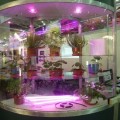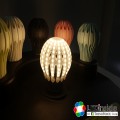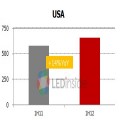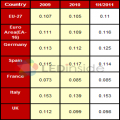2013-10-30
The LED industry is shifting. With competition increasing, falling prices, and continued developing in technology, LEDs are quickly surpassing incandescent and other forms of lighting, securing a stronghold in the industry. Among the many manufacturers in the lighting industry rushing to secure a position for themselves, MLS Lighting is one that has come out on top this year.
Continue reading →
2013-10-30
OLED TVs voluptuous curves and high image quality is failing to entice consumers, mainly due to its high price tag. Even the cheapest 55” OLED TV on the market released by Samsung still costs nearly US$ 9,000. But buyers after vibrant colors and HD image should not be discouraged as quantum dot technology might help drive down Ultra High Definition (UHD) LCD TV costs.
Continue reading →
2013-10-30
The LED market is growing with LED lighting applications expanding. LED lighting has grown from 22 percent in 2012 to 26 percent in 2013, according to Kuo, and is expected to grow further in 2014 to 30 percent. The market has benefited a lot by the introduction into smartphones by companies such as Samsung and LG. Smartphone applications surpassed feature phones in 2Q13 and have continued to dominate.
Continue reading →
2013-10-30
The LED industry’s fierce price competition is putting manufacturers under increasing pressure to cut costs. To stand out from the crowd, Russia based manufacturer Monocrystal has sought alternative sapphire substrate market applications other than LEDs, such as smartphone markets. Mikhail Berest, Senior VP Global Sales Director, Monocrystal sheds light on the company’s sapphire substrate technology that has enabled these high end applications at day one of LEDforum Taipei 2013 that took place at Evergreen International Convention Center on Oct. 16-17, 2013.
Continue reading →
2013-06-18
LED TV penetration rate for 2013 has the possibility to reach 90% with Chinese television manufactures playing the key role. LEDinside predict that the 71.3% penetration rate for 2012 will reach 90% in 2013, raising the rate to 91.4%. China’s six major television brands in the LED Backlight market have a possibility of reaching 95% permeability in 2013. China’s television backlight companies have a high possibility of becoming strong competitors for Korean, Taiwanese, and Chinese packaging companies. In the past, supply chains for television backlighting have been dominated by Taiwanese and Korean packaging companies, but China has been hot on their heels. With improvements being made to packaging technology and holding superiority in price, it’s worth observing whether or not China will be able to replace Taiwan and Korea as the leader in the backlight market.
Continue reading →
 2013-05-28
2013-05-28
The advanced technology of LED chip and package manufacturers as well as the declined market price has allowed LED lighting applications to be more diverse, and LED based-plant factories have also become the target market of global first-tier LED manufacturers. In fact, the idea of growing plants with electric lights has already been proposed in 1950 and implemented in 1970 (using traditional lighting products). Their goal was to grow high quality crops throughout the year and avoid damage caused by natural conditions and the excessive use of pesticides.
Continue reading →
2013-05-24
LED lighting applied to plant factories is not a new concept. 2-3 years ago, international first-tier manufacturers Philips and OSRAM started to invest in plant factories that are equipped with LED lighting and excellent environmental control, and Japan has also been developing this business for quite some time. LEDinside indicated that since public and commercial LED lighting are becoming more mature, plant factories may become the next target of LED lighting manufacturers from Europe, the US, Japan, and Taiwan. Viewing the success of this business as a political achievement, the Chinese government has greatly encouraged LED manufacturers to invest in plant factories.
Continue reading →
2013-03-25
Global market intelligence organization TrendForce’s green energy research division LEDinside and EnergyTrend analysis points out that every country, one by one is progressing towards replacement energy plans. Why then consider energy efficient and clean energy electric power? The energy saving benefits from replacing traditional lighting with LED lights is obvious: Overall replacement with LED lighting can substitute part of nuclear plants or traditional thermal power plants.
Continue reading →
 2012-09-22
2012-09-22
2012 is an unusual year for global lighting as government around the world begins to commit in promoting energy-saving policies of banning incandescent lamps, and the cost of LED lighting keeps to fall; these factors help to stimulate the growth of the energy-saving market.
Continue reading →
2012-09-21
As the price downtrend persists, LED light bulb market has descended into a cut-throat competition, and the future does not look bright. In order to survive, LED lighting firms have been seeking other markets such as convenient store lighting and office lighting, aiming to increase their products’ added value and increase their market acceptance. “We won Aeon’s bidding process for its first project, acquiring the opportunity to expand the company’s business in Japan. Although we did not win the second project, we will keep looking for other chances,&rdqu...
Continue reading →
 2012-09-12
2012-09-12
LEDinside, a research division of TrendForce, conducted a survey showing that the retail price of worldwide LED bulb is decreasing slightly in July, 2012. For the first time, the bottom price of the commodity is below 10 USD in Britain, which would replace 40-watt incandescent lamp. Besides, the average price of the commodity which takes place of 60-watt incandescent lamp is also falling stably in all the world. More than that, at the moment LED bulb incline to be cost-effective and most famous manufacture are trying to keeping their high quality standards of prod...
Continue reading →
2012-09-03
Starting from October 1, China will officially ban 100W incandescent light bulb sales on the market. With less than one month out, industry experts show reasonable concerns about the market prospects incandescent light ban can bring to LED lighting bulb. Industry experts note that Japan, Korea and North America are the major markets of LED light bulbs. With European debt crisis persists, LED industry is not too optimistic about the market prospects post October 1. According to LEDinside, global big-name companies such as OSRAM, GE Lighting, Philips al...
Continue reading →
 2012-08-09
2012-08-09
According to LEDinside, the LED research division of TrendForce, major lighting markets in the world have been affected by the European debt crisis in varying degrees. Certain Chinese LED firms whose businesses rely heavily on overseas markets have seen a decline in orders, which is particularly pronounced in the European lighting market. As a result, many LED companies start to shift their focus to the Chinese LED bidding market. In fact, China has recently restarted the bidding for LED subsidies in July, which provided hope for many LED firms. As for th...
Continue reading →
2012-07-24
Among all the LED products, LED light bulb is by far the most relevant as far as the end users are concerned. However, it has always been difficult for the consumers to tell the specifications differences between assorted LED light bulbs. For example, Japanese big name company Toshiba’s LED light bulbs have three kinds of product codes. Consumers oftentimes buy the wrong products due to their inability to read the product codes. Lack of a universal product codes for global LED light bulbs proves to be a very serious issue. Global giants Philips, GE, Osr...
Continue reading →
2012-07-17
The LED lighting consumer market in China has always been more or less stagnant and the market prospects have been largely debated: what is the future looks like for LED consumer market in China? How can LED lighting see a wider adoption in consumer-based areas? At LEDinside’s LEDforum Guangzhou 2012 held at Guangzhou International Lighting Exhibition in June 2012, Sean Zhou, the Regional Marketing Director of Philips Lumileds, noted that although a considerable amount of expectations riding on the LED consumer market, its market share pales in co...
Continue reading →
 2012-05-28
2012-05-28
According to TrendForce’s “2011-2015 European LED Lighting Market Report” by the LED research division LEDinside, European LED lighting market’s rapid growth is attributed to the energy-saving awareness and high electricity prices in Europe, especially the latter. For example, if a 7W LED light bulb (a replacement for 40W incandescent light bulb) is used for eight hours a day for a month (31 days), it can save 8 kWh compared to using an 40W incandescent light bulb. With the electricity prices of EU-27, US$2 can be saved every month by...
Continue reading →
2012-02-23
The BOD of Samsung approved the spin-off of the LCD business from Samsung to become a new cooperation named Samsung Display. Going forward, the new corporation will consider a merger with Samsung Mobile Display to enhance their flat panel display business. According to WitsView, the LCD research division of TrendForce, the main purpose for the spin-off of the LCD business, which will be operating independently from Samsung Electronics, is to strengthen the competitiveness of the display business based on a more flexible strategy. On the other hand, the re...
Continue reading →
2011-12-14
When the year 2011 is drawing close to an end, a look back at the LED industry reveals a lively and volatile market: some companies have got listed; some have gone bankrupt; some are running in the red; and others are out of business with bosses fleeing over big debts. In the end, the surviving LED manufacturers of a certain scale are actively developing local market. However, few can make money. In general, those who make a profit in the LED field remain to be manufacturers selling in the international market due to their relatively high gross profit. It is true that many L...
Continue reading →
 2013-05-28
2013-05-28
 2012-09-22
2012-09-22
 2012-08-09
2012-08-09
 2012-05-28
2012-05-28